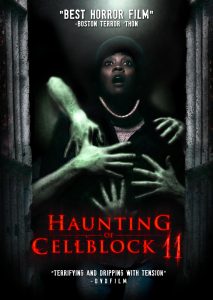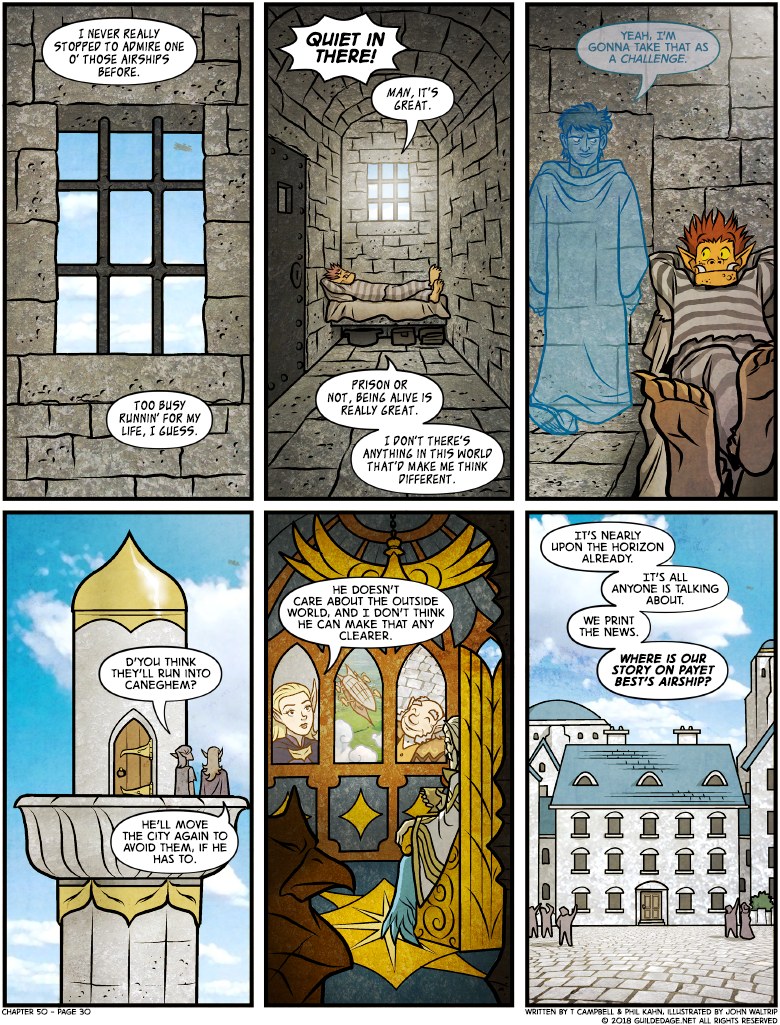Annotated 50-30
 Ooh, that’s a shock…no, wait, that’s Ashok. And so Ulak finally gets his just deserts for betraying his friend for Cultism, in which he no longer believes.
Ooh, that’s a shock…no, wait, that’s Ashok. And so Ulak finally gets his just deserts for betraying his friend for Cultism, in which he no longer believes.
Meanwhile, Caneghem sits and scries on the people who meant more to him than he ever found the words to express. And now he never will.
To sum this page up: not everyone gets a happy ending, not even in the beginnings of a truly golden age.
(It’s a pretty happy ending for Ashok, though! And for Clair, it’s more a moment’s pause in a life still marked by loss but trending toward happiness.)
Honestly, I too would love to read the article that The News is going to run about Payet Best (and those other guys)’s airship.
FB: Somebody’s clearly feeling the pressure of Newlight’s fast-paced, 24-minute-a-day news cycle.












Was it ever explained why the sky elves have so many avian motifs in their architecture?
Gonna assume it’s because a race of people who live in the sky feel a certain kinship with birds. Doesn’t necessarily have to be Avians.
That said, makes me wonder if they *did* have better relations with the Avians at one point. Would make a lot of sense for both races to at least run into one another a bunch and maybe form an accord, which then got more and more strained over time, until the Avians threw their lot in with the worlds rebellion.
Now I am imagining those motifs getting established before they met any actual avians, perhaps helped along by a local equivalent of Egypt mania, and their sense of cultural superiority forcing them to keep it on the basis that “No, it our heritage. Our imaginary platonic ideal bird people have nothing to do with you mundane actual bird people.”
I don’t know, given the way Ashok behaved during the con I can’t see him being viscous enough to provide any actual torment with his haunting. I read this as the opening to a twisted buddy comedy that, if anything, drives everyone else in the prison nuts while mostly being entertaining for Ulak.
Basically the set-up of Red Dwarf, with the hologram guy swapped for a ghost.
I’d watch the smeg out of that
I hope you’re right.
I realize this is probably a reaction Flo and T wouldn’t have expected anybody to have, but I’m honestly not seeing Ashok as having any justified grievances here. “I know we both betrayed our respective peoples to join a cult which worships death and regards death as a gift, and I announced that I’d make everyone who hadn’t recognized my not-actually-existent genius pay, but you STABBED me!”
I’m not altogether sure I follow. Ashok’s joining Cultism and ranting like a mad scientist at the admissions booth aren’t really moral equivalents to killing a friend in cold blood. It’s possible Ashok committed atrocities we didn’t see, with Ulak or on his own, but he seems to be like what Gravedust described here: someone who joined for a sense of community without really buying in. And even if he were a lot worse, he’d still have a justified grievance, just like Iwatani Sr. would be justified in locking Taro up if Taro’s assassination plan had somehow failed. All the other evils Iwatani Sr. had committed would not un-justify his beef with his son, in that case. Same applies here.
I suppose if I were to look for reasons for Ashok to get over it, I’d say “Hey, loving your own death is part of CULTIST CULTURE, mac. This is what you signed on for! Get with it!” Thing is, if that retort applies to Ashok, it applies at least as well to Ulak…and just like Ashok, when faced with his own end, Ulak discovered he wasn’t as committed to that culture as he thought. It’s just that Ulak was smart and lucky enough to save his own life instead of getting sucker-stabbed.
I like nearly all the characters I work with, and I think Ulak comes off disproportionately likable, despite his own sins. It helps that he was usually standing next to someone much crazier and eviler than he was (Brother Tom or HR). But it’s hard for me to say he hasn’t earned a good solid haunting, and I don’t think the sleep deprivation is going to be “entertaining” for long. Ashok’s soft spot for his old friend may make him stop short of hounding Ulak to death, once Ulak starts trying to appease him. But in my own reading, it’s at least gonna be an ordeal.
Ah. I disagree with every word you say about morality here, so it’s not surprising that we don’t agree. Ashok joined a death cult. He had no grounds of any sort to be upset that another member of the death cult…actually believed in it (nor does the fact that the other death cult member changed his mind later change that; if HR had told the other cultists “now, we need a sacrifice to open the portal…Ulak, I choose you!” and Ulak had chosen to run then, with no “I’m starting to doubt my faith” setup, then I would nod at statements of poetic justice and cosmic irony, but that’s not what happened).
And Iwatani Sr. literally told his son to poison family members if they’re in your way, and showed off gloating over his son’s “uncle.” Obviously, he would have taken steps of some kind had he survived the assassination attempt, because he could, without any worries about justification–but while he certainly would have been shocked, outraged, and hurt, I wouldn’t have the smallest trace of sympathy for any of those feelings. So I guess I should take part of my start back: I agree with the words that say Ashok’s grievance against Ulak is as valid as Iwatani Sr.’s grievance against Taro.
The way I see it, it would help if you compare these cultists with real-world fringe groups. In the real world, radical subversive militiae or those other really scary groups of unbalanced malcontents found in fringe social media are ways for people that feel that they really don’t fit in regular society to feel they fit in somewhere. They don’t want to be with “them”; these dissafected misfits want to be with others that also feel left out by the “normies”. If you finally feel you have found a place among “your people” only to get a knife in the back the moment you turn your back on them, you could understandably feel betrayed.
Same thing with the Iwatanis. His Grace Iwatani taught his son that humanity is a mixture of a few clever, superior people, and then the rest of humanity are inferior losers you’re suposed to take advantage from. It never dawned upon him that his son would say “Very well said, loser“, because, to Daddy Iwatani, including his family (or at least his son) in the elite was a no-brainer. As abhorrent and despicable as Iwatani Sr. was, he at least considered his son as one of his own kind, a basic courtesy Taro refused to repay.
I see why Dante Alighieri placed traitors as the lowest form of sinners in his Divine Comedy
So, if we say that Western Civilization is a Death Cult (arguably is), does that mean that members of Western Civilizations has no right to feel any sort of resentment for any sort of mistreatment?
I don’t think that’s how morality works.
There’s no-one sitting on high making the judgment calls.
Everybody thinks they’re at the very least better than average.
Never does it occur that someone gets stabbed and say “OK yeah, I deserved this”.
Seems to me, given Carnegham’s magical prowess, if he really wants to get word to the people he cares about, he can. It’s going to be up to him as to whether or not he can swallow his pride enough to do so.
I interpreted the fifth panel as Caneghem keeping an eye on the nation formerly known as Gastonia since they could still be a future problem. Caneghem cared about people like Clair and Reynolds in his own way, but I think he knew his people too well and decided moving the city was what the majority of them would accept. Obviously, Clair and Hollister overestimated their support among the sky elf masses, but of course those same people didn’t want to remain allied with Gastonia since the Altruists would only seek to dominate them in time and some new world order would still oppose their conjuring and likely bring about cultural pollution. All in all he seems to have gotten his Brexit right.
Today I learned that “just deserts” uses an archaic word I was unfamiliar with. I thought “deserts” always referred to “more than one very dry place”.
I was surprised to learn that too; I’d always thought the phrase was “just desserts”, but then, in my household while growing up, dessert after dinner was only given as a reward for good behavior, so the phrase made sense to me that way. I was never given a dessert that was actually a punishment, but then I never had a Christmas stocking full of nothing but coal dust either.
It’s from the same root as “deserve.” And yeah, I used to think the same.
The last sentence in panel 2 is still missing a word; it should be “I don’t *think* there’s…”
Anyway, the archmage’s real-world namesake Jon Van Caneghem is apparently involved in a game development project called “Cloud Castles” which is quite a coincidence.
Caneghem can literally just send them a mail, so I doubt it’s wistfulness.
More like he’s a bit of a voyeur, and Sky Elf Cable just doesn’t do High Drama like the groundbound people do.
Bloody colonial of him, if you ask me.